A national randomized controlled trial of the impact of public Montessori preschool at the end of kindergarten
A.S. Lillard, D. Loeb, J. Berg, M. Escueta, K. Manship, A. Hauser, & E.D. Daggett, A national randomized controlled trial of the impact of public Montessori preschool at the end of kindergarten, Proc. Natl. Acad. Sci. U.S.A. 122 (43) e2506130122, https://doi.org/10.1073/pnas.2506130122 (2025).
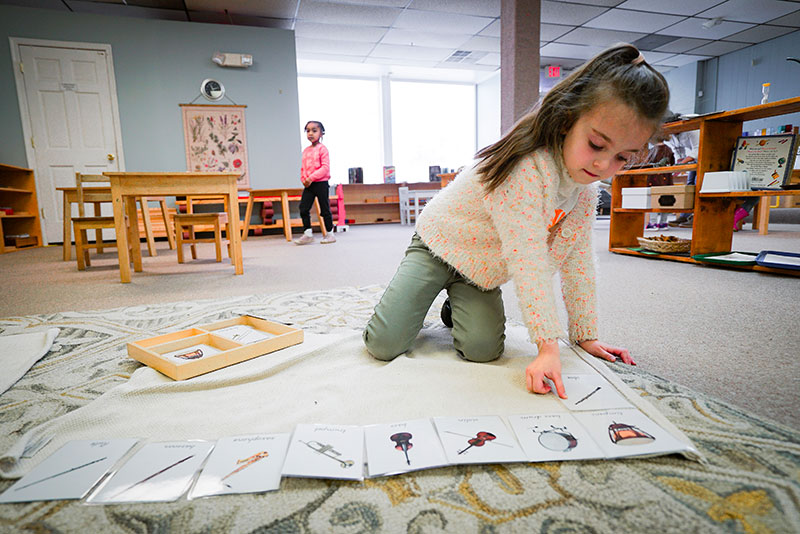 This study followed from age 3 through kindergarten 588 children entered in lotteries at 24 public Montessori schools across the United States. We found that the treatment group had significantly better end-of-kindergarten outcomes for reading, short-term memory, executive function, and social understanding. We also found that three years of public Montessori from ages 3 to 6 cost districts $13,127 less per child than traditional programs, largely due to higher child:teacher ratios in PK3-PK4.
This study followed from age 3 through kindergarten 588 children entered in lotteries at 24 public Montessori schools across the United States. We found that the treatment group had significantly better end-of-kindergarten outcomes for reading, short-term memory, executive function, and social understanding. We also found that three years of public Montessori from ages 3 to 6 cost districts $13,127 less per child than traditional programs, largely due to higher child:teacher ratios in PK3-PK4.
Perfect timing: sensitive periods for Montessori education and long-term wellbeing
Lillard, A. S., Jiang, R. H., & Tong, X. (2025). Perfect timing: Sensitive periods for Montessori education and long-term wellbeing. Frontiers in Developmental Psychology, 3. https://doi.org/10.3389/fdpys.2025.1546451
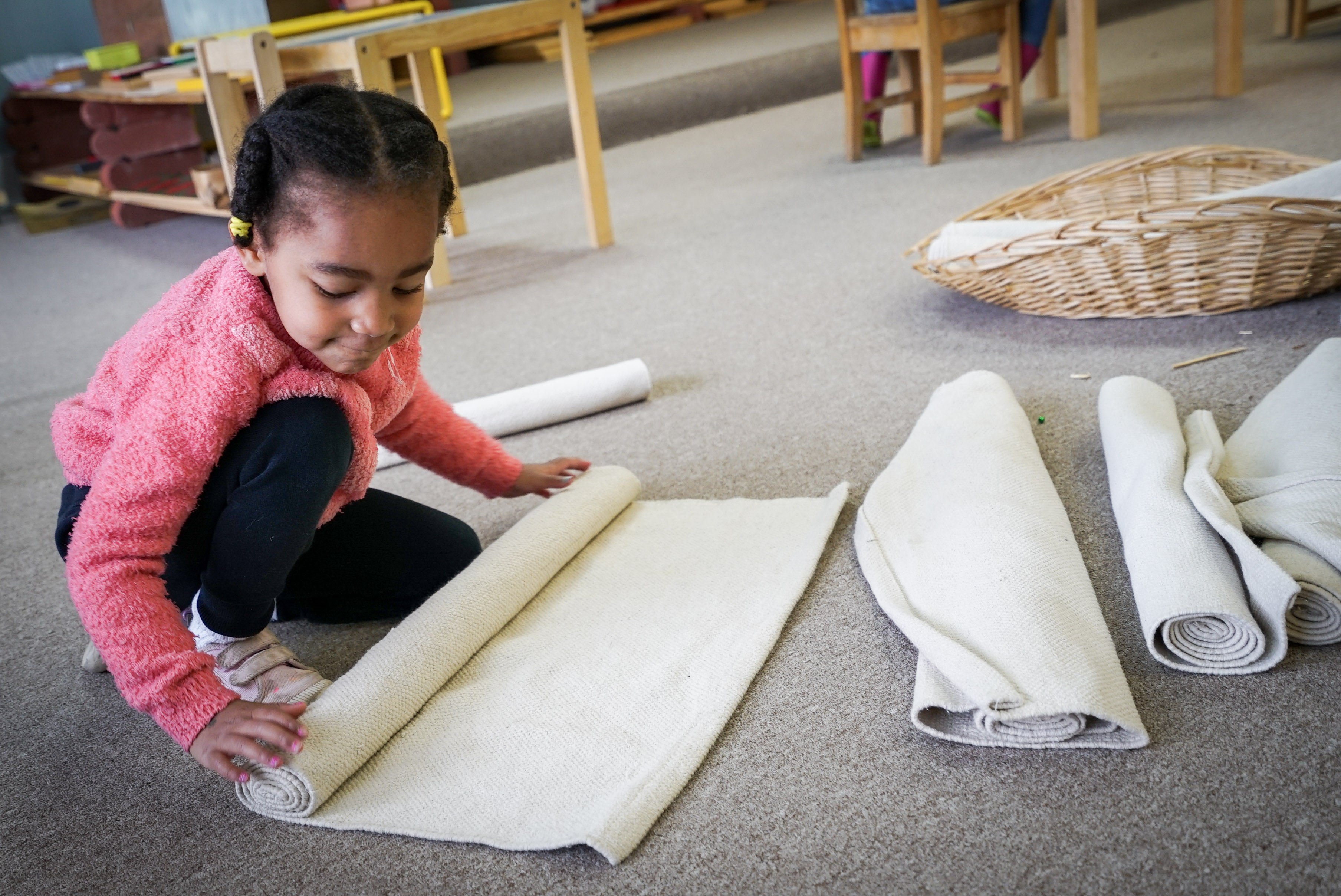 A prior study found that Montessori attendance as a child, controlling for demographic factors including SES, was associated with higher adult wellbeing, and that the longer one had attended Montessori school, the higher one's adult wellbeing. In this study we ask if there are more optimal ages, in terms of an association with long-term wellbeing, to attend Montessori schools, and more optimal ages to transition from Montessori to conventional schools. Although attending Montessori during every period through age 12 predicted higher adult wellbeing, the strongest effects were found for attending Montessori during preschool (ages 3 to 6), and for attending it for 3 rather than just 2 preschool years. We also found that the wellbeing factor of “Engagement” was higher if one had transitioned out of Montessori at the end of one of the 3-year-cycles (as opposed to in the middle) and there was a trend towards higher General Wellbeing. We discuss the implications for parents and for education policy.
A prior study found that Montessori attendance as a child, controlling for demographic factors including SES, was associated with higher adult wellbeing, and that the longer one had attended Montessori school, the higher one's adult wellbeing. In this study we ask if there are more optimal ages, in terms of an association with long-term wellbeing, to attend Montessori schools, and more optimal ages to transition from Montessori to conventional schools. Although attending Montessori during every period through age 12 predicted higher adult wellbeing, the strongest effects were found for attending Montessori during preschool (ages 3 to 6), and for attending it for 3 rather than just 2 preschool years. We also found that the wellbeing factor of “Engagement” was higher if one had transitioned out of Montessori at the end of one of the 3-year-cycles (as opposed to in the middle) and there was a trend towards higher General Wellbeing. We discuss the implications for parents and for education policy.
What we know about what we do: The evidence behind Montessori Practice
Borgman, C., Shenk-Evans, W., Monnier, D., Kadambi, V., & Lillard, A.S. (2024). What we know about what we do: The evidence behind Montessori Practice. The Montessori Public Policy Initiative. https://montessoriadvocacy.org/wp-content/uploads/2025/01/MPPI_Reports_2025.pdf
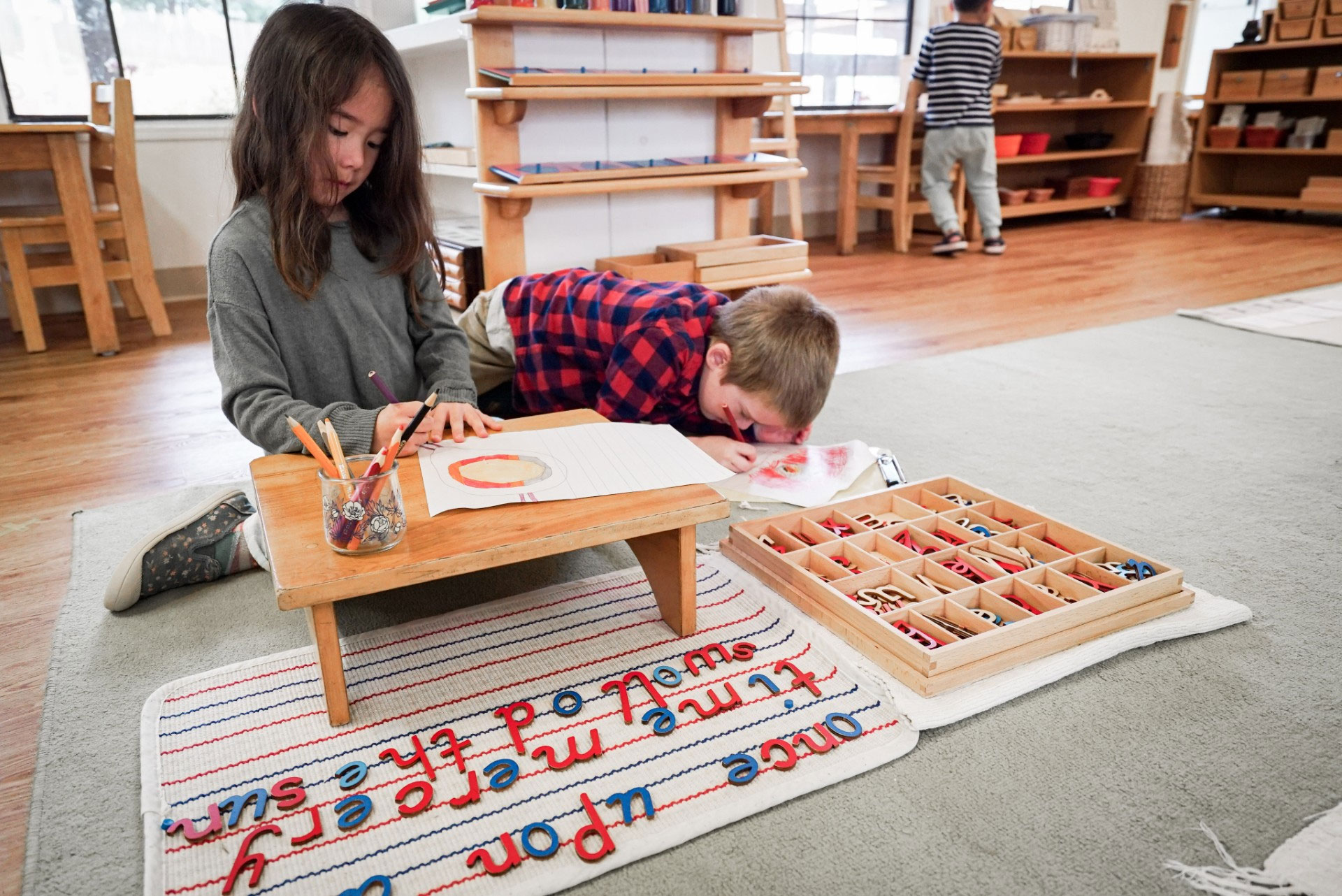 To further the impact of MPPI’s Montessori Essentials, Montessori Science has partnered with MPPI to release the following series of literature reviews which compile and evaluate the evidence from wide bodies of educational, developmental, and psychological research to establish what is known about specific elements of Montessori practice. In doing so, they provide evidence in support of essential Montessori practices and offer specific policy recommendations that align with current data, reinforcing the case for high-fidelity Montessori education.
To further the impact of MPPI’s Montessori Essentials, Montessori Science has partnered with MPPI to release the following series of literature reviews which compile and evaluate the evidence from wide bodies of educational, developmental, and psychological research to establish what is known about specific elements of Montessori practice. In doing so, they provide evidence in support of essential Montessori practices and offer specific policy recommendations that align with current data, reinforcing the case for high-fidelity Montessori education.
When bigger looks better: CLASS results in public Montessori preschool classrooms
Lillard, A. S., LeBoeuf, L., Borgman, C., Martynova, E., Faria, A.-M., & Manship, K. (2025). When bigger looks better: CLASS results in public Montessori preschool classrooms. Early Childhood Research Quarterly, 70, 199–210. https://doi.org/10.1016/j.ecresq.2024.10.003
 Here we used data from the first national study of public Montessori preschool to examine CLASS data in Montessori preschool classrooms as compared to a lottery-control-selected set of business-as-usual ones. Montessori classrooms (n = 54) had 50% more children on average, and significantly higher child:adult ratios (roughly 9 vs. 6) than a set of intentionally stratified control classrooms (n = 19 of 128), and CLASS scores did not differ across classroom types. Children in Montessori classrooms were observed in whole group activities during fewer cycles and in freely chosen activities during more cycles; also children were observed engaging with math content during more cycles in Montessori than in control classrooms. Counterintuitively, but consistent with Montessori theory, Montessori classrooms with larger class sizes (up to 26) had higher Emotional Support and Classroom Organization domain scores, and those with higher child:adult ratios (up to 13:1) trended towards higher Instructional Support domain scores.
Here we used data from the first national study of public Montessori preschool to examine CLASS data in Montessori preschool classrooms as compared to a lottery-control-selected set of business-as-usual ones. Montessori classrooms (n = 54) had 50% more children on average, and significantly higher child:adult ratios (roughly 9 vs. 6) than a set of intentionally stratified control classrooms (n = 19 of 128), and CLASS scores did not differ across classroom types. Children in Montessori classrooms were observed in whole group activities during fewer cycles and in freely chosen activities during more cycles; also children were observed engaging with math content during more cycles in Montessori than in control classrooms. Counterintuitively, but consistent with Montessori theory, Montessori classrooms with larger class sizes (up to 26) had higher Emotional Support and Classroom Organization domain scores, and those with higher child:adult ratios (up to 13:1) trended towards higher Instructional Support domain scores.
Montessori education's impact on academic and nonacademic outcomes
Randolph, J. J., Bryson, A., Menon, L., Henderson, D. K., Kureethara Manuel, A., Michaels, S., rosenstein, d. l. w., McPherson, W., O'Grady, R., & Lillard, A. S. (2023). Montessori education's impact on academic and nonacademic outcomes: A systematic review. Campbell Systematic Reviews, 19, e1330.
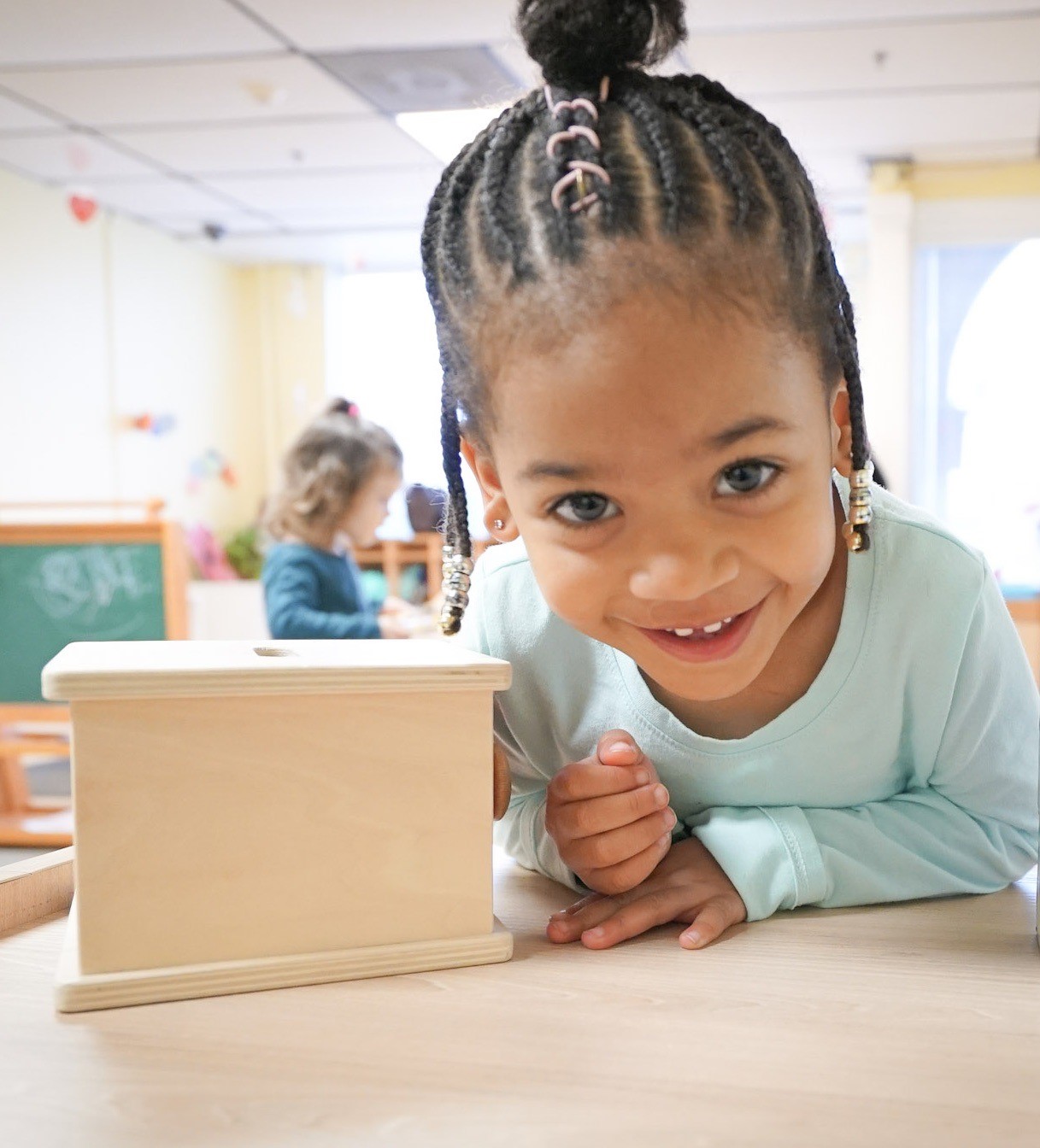 Using only studies with evidence of baseline equivalence, this review found that Montessori education had a significant positive impact on academic and nonacademic outcomes. Studies with random assignment, elementary school age level, and private Montessori schools had larger effects.
Using only studies with evidence of baseline equivalence, this review found that Montessori education had a significant positive impact on academic and nonacademic outcomes. Studies with random assignment, elementary school age level, and private Montessori schools had larger effects.
How children learn to read: An overview
Borgman, C & Lillard, A.S.. How children learn to read: An overview. MontessoriPublic. Fall, 2022.
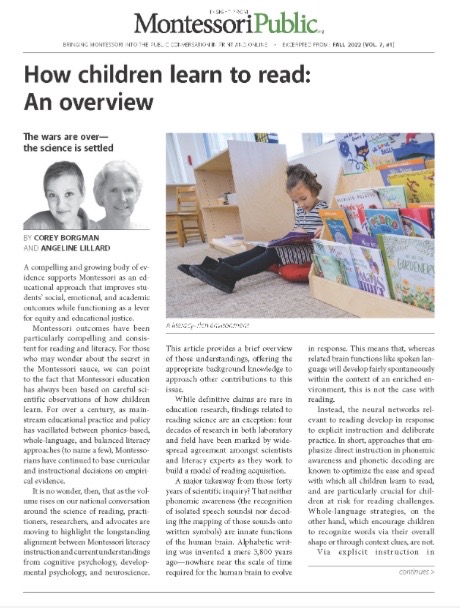
A compelling and growing body of evidence supports Montessori as an educational approach that improves students’ social, emotional, and academic outcomes while functioning as a lever for equity and educational justice.
Montessori outcomes have been particularly compelling and consistent for reading and literacy. For those who may wonder about the secret in the Montessori sauce, we can point to the fact that Montessori education has always been based on careful scientific observations of how children learn. For over a century, as mainstream educational practice and policy has vacillated between phonics-based, whole-language, and balanced literacy approaches (to name a few), Montessorians have continued to base curricular and instructional decisions on empirical evidence.
Standardized test performance in Public Montessori schools.
Lillard AS, Tong X, Snyder A. Standardized test performance in public Montessori schools. Journal of School Choice. 2022.
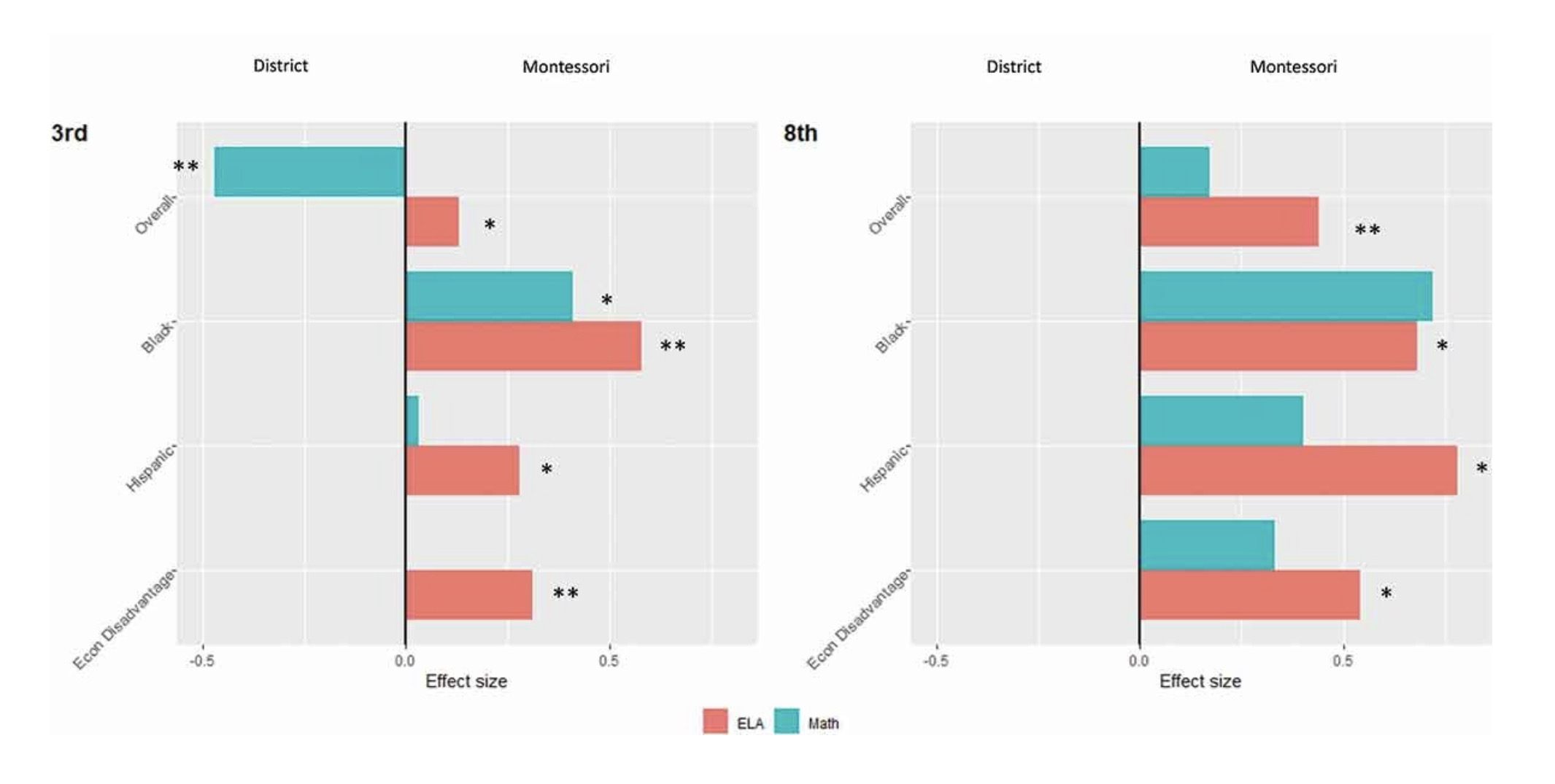 Here we report on this for the 10 states/regions with the most public Montessori schools (n = 195). In 3rd grade, Montessori schools were less proficient in math but more proficient in ELA. In 8th grade they were also more proficient on ELA and showed a trend to greater proficiency in math. Black, Hispanic, and economically disadvantaged students at Montessori schools were more proficient on ELA tests, and performed better or similarly on math tests, at both grade levels.
Here we report on this for the 10 states/regions with the most public Montessori schools (n = 195). In 3rd grade, Montessori schools were less proficient in math but more proficient in ELA. In 8th grade they were also more proficient on ELA and showed a trend to greater proficiency in math. Black, Hispanic, and economically disadvantaged students at Montessori schools were more proficient on ELA tests, and performed better or similarly on math tests, at both grade levels.
An association between Montessori education in childhood and adult wellbeing
Lillard, A.S., Meyer, M.J., Vasc, D., & Fukuda E. (2021) An association between Montessori education in childhood and adult wellbeing. Frontiers in Psychology, 12, 5351.
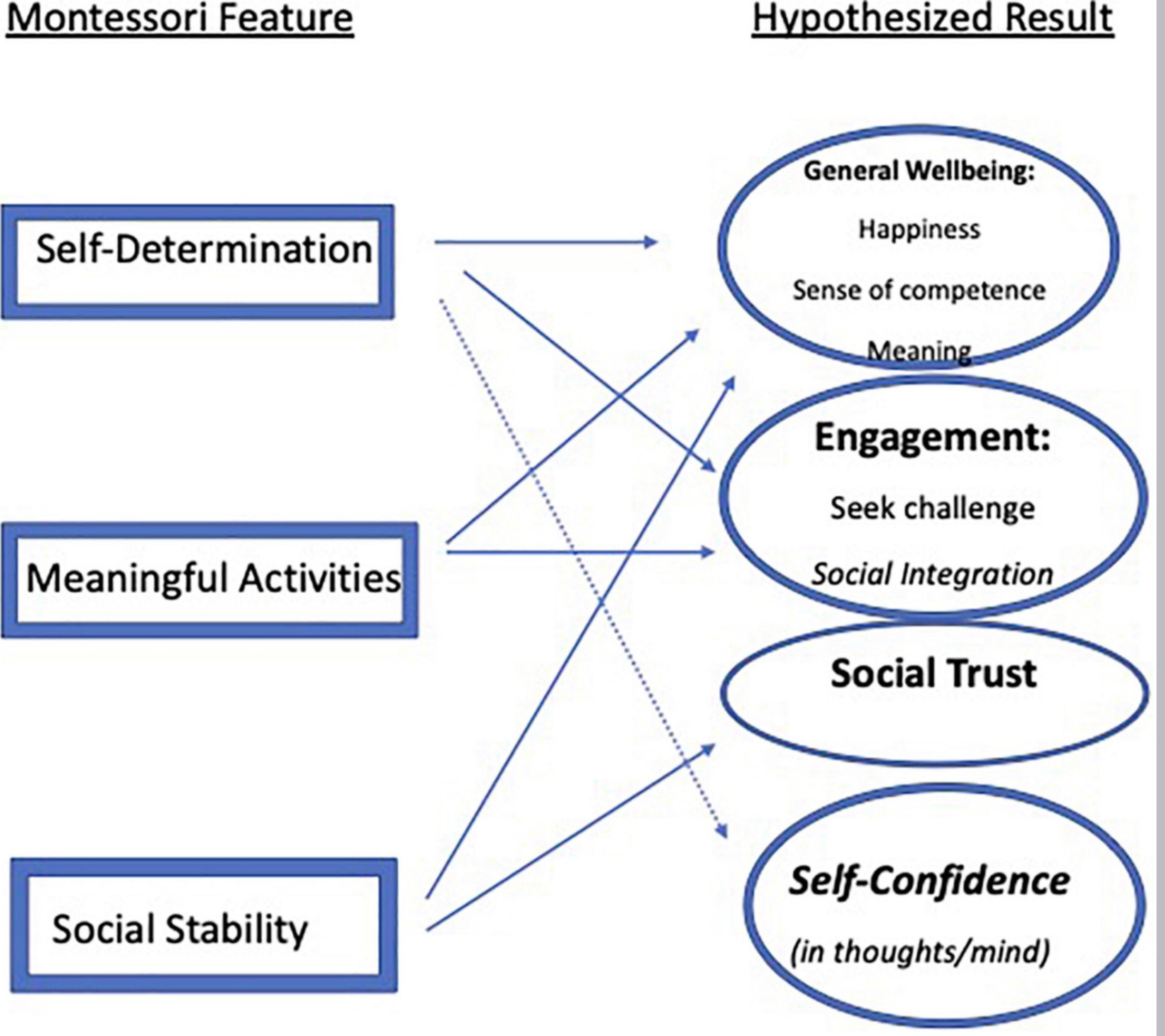 Wellbeing, or how people think and feel about their lives, predicts important life outcomes from happiness to health to longevity. Here, 1905 adults, ages 18–81 (M = 36), filled out a large set of wellbeing scales followed by demographic information including type of school attended each year from 2 to 17. We first developed a measurement model of wellbeing using the survey data, arriving at four factors: general wellbeing, engagement, social trust, and self-confidence. Attending Montessori for at least two childhood years was associated with significantly higher adult wellbeing on all four factors. A second analysis found that the difference in wellbeing between Montessori and conventional schools existed even among the subsample that had exclusively attended private schools. A third analysis found that the more years one attended Montessori, the higher one’s wellbeing as an adult. This study suggests that attending Montessori as a child might plausibly cause higher adult wellbeing.
Wellbeing, or how people think and feel about their lives, predicts important life outcomes from happiness to health to longevity. Here, 1905 adults, ages 18–81 (M = 36), filled out a large set of wellbeing scales followed by demographic information including type of school attended each year from 2 to 17. We first developed a measurement model of wellbeing using the survey data, arriving at four factors: general wellbeing, engagement, social trust, and self-confidence. Attending Montessori for at least two childhood years was associated with significantly higher adult wellbeing on all four factors. A second analysis found that the difference in wellbeing between Montessori and conventional schools existed even among the subsample that had exclusively attended private schools. A third analysis found that the more years one attended Montessori, the higher one’s wellbeing as an adult. This study suggests that attending Montessori as a child might plausibly cause higher adult wellbeing.
An alternative to "no excuses": Considering Montessori as culturally responsive pedagogy
Lillard AS, Taggart J, Yonas D, Seale MN. An alternative to "no excuses": Considering Montessori as culturally responsive pedagogy. Journal of Negro Education. In Press.
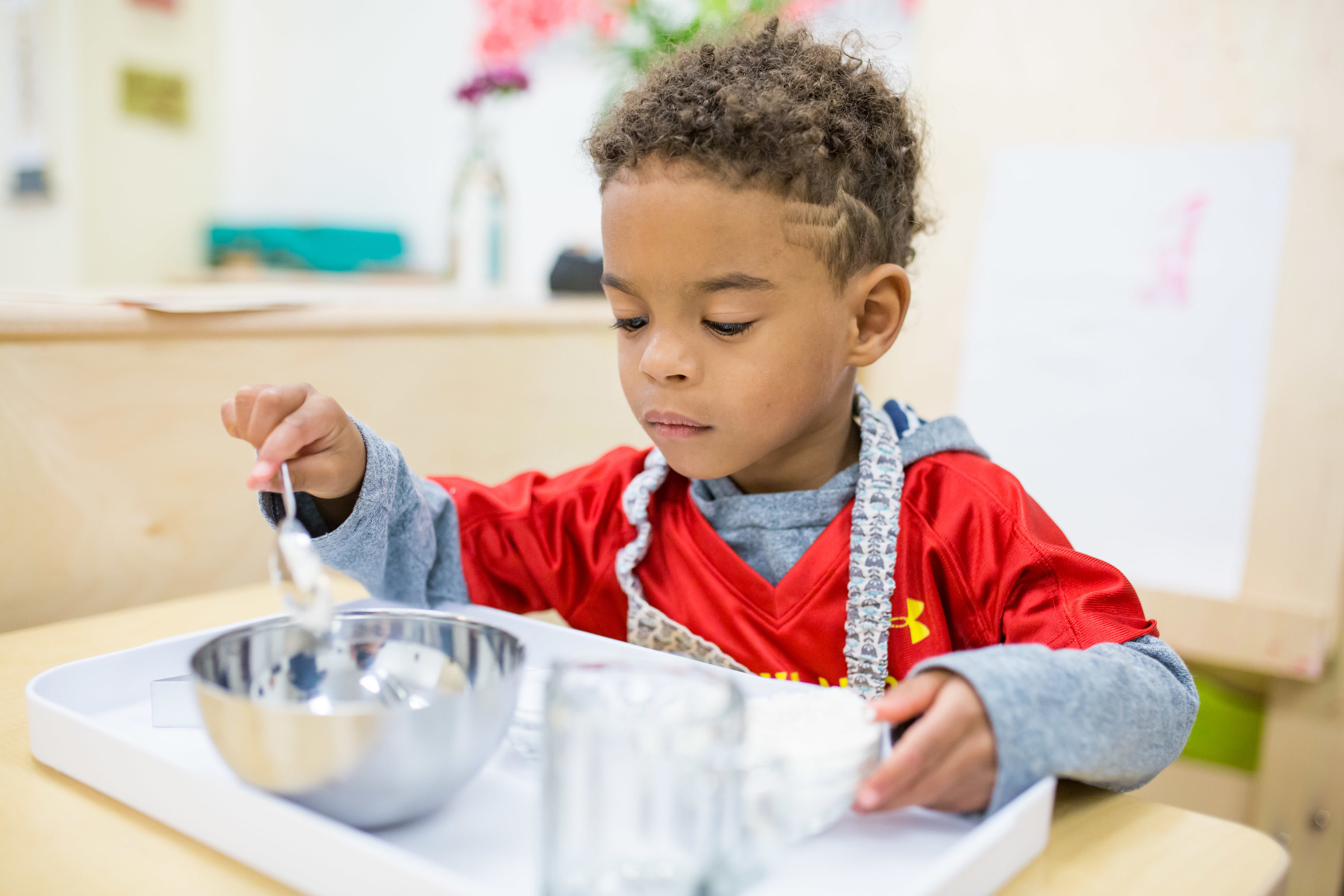 To address inequality, philanthropists support “no excuses” schools in majority-Black low income communities. While the model has raised achievement, its practices are problematic from a social justice lens. Montessori is a highly contrasting model, and over 25% of public Montessori students are Black. Here we examine whether Montessori is a viable alternative school model for Black children. After showing the theoretical alignment between Montessori and culturally responsive pedagogy, we review studies of Montessori outcomes, then we present a new mixed-methods study of 12 adults who attended a primarily Black Montessori preschool. Their descriptions reflect that Montessori’s lived experience is as a culturally responsive pedagogy. The evidence suggests Montessori avoids the concerns raised by no excuses schools while delivering positive outcomes.
To address inequality, philanthropists support “no excuses” schools in majority-Black low income communities. While the model has raised achievement, its practices are problematic from a social justice lens. Montessori is a highly contrasting model, and over 25% of public Montessori students are Black. Here we examine whether Montessori is a viable alternative school model for Black children. After showing the theoretical alignment between Montessori and culturally responsive pedagogy, we review studies of Montessori outcomes, then we present a new mixed-methods study of 12 adults who attended a primarily Black Montessori preschool. Their descriptions reflect that Montessori’s lived experience is as a culturally responsive pedagogy. The evidence suggests Montessori avoids the concerns raised by no excuses schools while delivering positive outcomes.
Montessori preschool elevates and equalizes child outcomes: A longitudinal study
Lillard AS, Heise MJ, Richey EM, Tong X, Hart A, Bray PM. Montessori Preschool Elevates and Equalizes Child Outcomes: A Longitudinal Study. Front Psychol. 2017 Oct 30;8:1783. doi: 10.3389/fpsyg.2017.01783. PMID: 29163248; PMCID: PMC5670361.
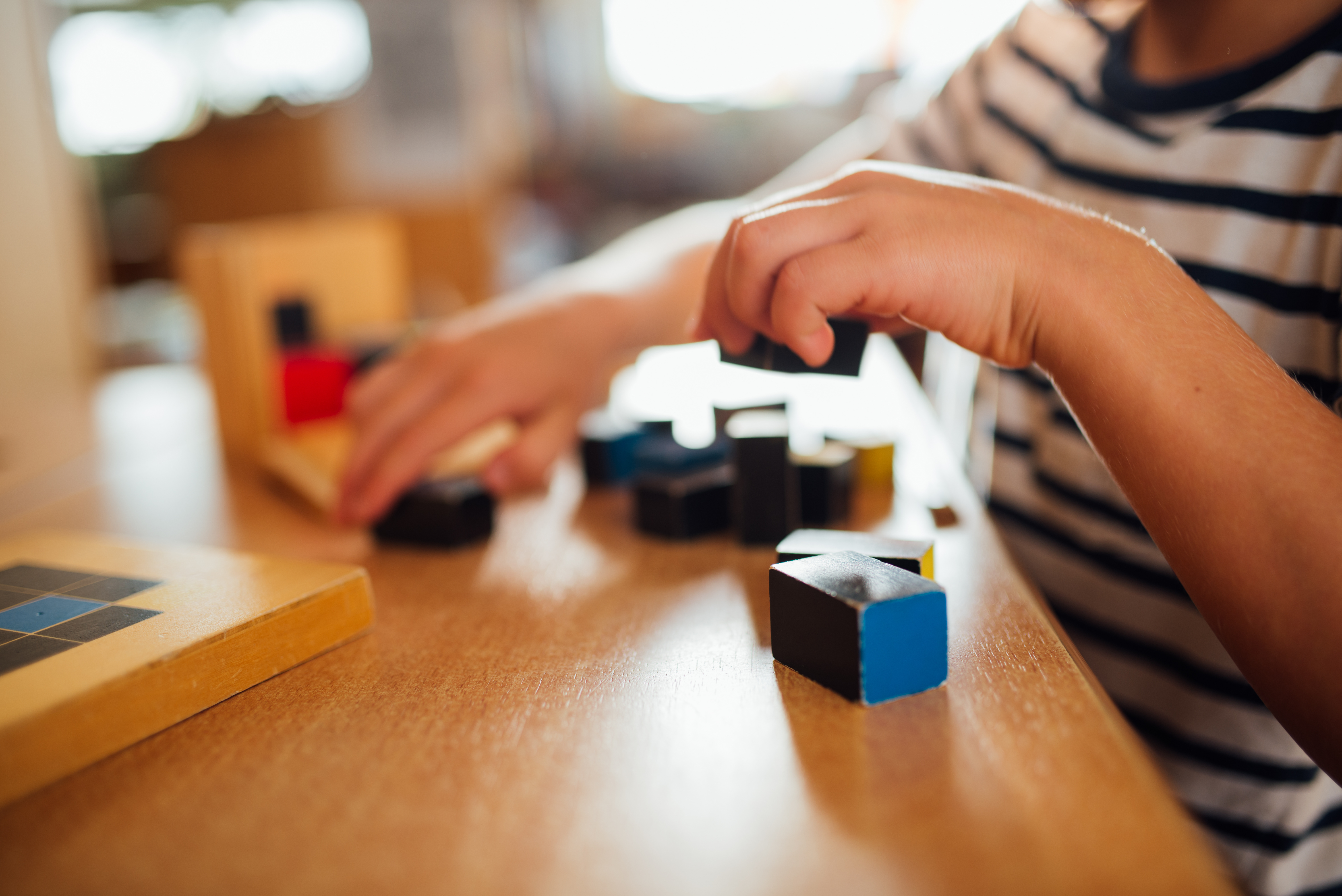 Here we report a longitudinal study that took advantage of randomized lottery-based admission to two public Montessori magnet schools in a high-poverty American city. Montessori preschool elevated children’s outcomes in several ways. Over time the Montessori children fared better on measures of academic achievement, social understanding, and mastery orientation, and they also reported relatively more liking of scholastic tasks. They also scored higher on executive function when they were 4. In addition to elevating overall performance on these measures, Montessori preschool also equalized outcomes among subgroups that typically have unequal outcomes. This suggests that Montessori preschool has potential to elevate and equalize important outcomes, and a larger study of public Montessori preschools is warranted.
Here we report a longitudinal study that took advantage of randomized lottery-based admission to two public Montessori magnet schools in a high-poverty American city. Montessori preschool elevated children’s outcomes in several ways. Over time the Montessori children fared better on measures of academic achievement, social understanding, and mastery orientation, and they also reported relatively more liking of scholastic tasks. They also scored higher on executive function when they were 4. In addition to elevating overall performance on these measures, Montessori preschool also equalized outcomes among subgroups that typically have unequal outcomes. This suggests that Montessori preschool has potential to elevate and equalize important outcomes, and a larger study of public Montessori preschools is warranted.
Preschool children's development in classic Montessori, supplemented Montessori, and conventional programs
Lillard, Angeline. (2012). Preschool children's development in classic Montessori, supplemented Montessori, and conventional programs. Journal of school psychology. 50. 379-401. 10.1016/j.jsp.2012.01.001.
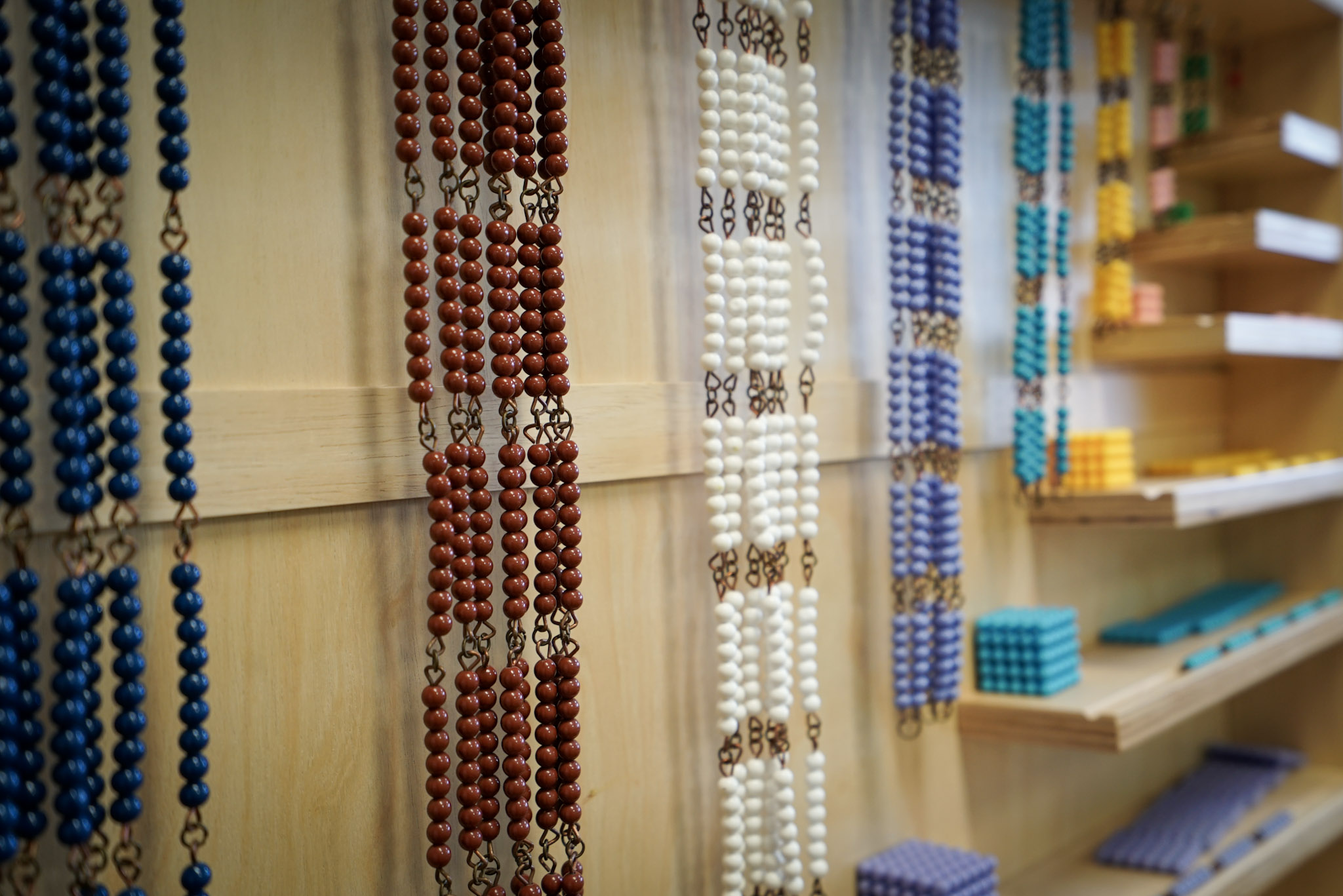 To test whether outcomes vary according to fidelity of Montessori implementation, we examined preschool children enrolled in high fidelity classic Montessori programs, lower fidelity Montessori programs that supplemented the program with conventional school activities, and conventional programs. Children in Classic Montessori programs showed significantly greater school-year gains on outcome measures of executive function, reading, math, vocabulary, and social problem-solving, suggesting that high fidelity Montessori implementation is associated with better outcomes than lower fidelity Montessori programs or conventional programs.
To test whether outcomes vary according to fidelity of Montessori implementation, we examined preschool children enrolled in high fidelity classic Montessori programs, lower fidelity Montessori programs that supplemented the program with conventional school activities, and conventional programs. Children in Classic Montessori programs showed significantly greater school-year gains on outcome measures of executive function, reading, math, vocabulary, and social problem-solving, suggesting that high fidelity Montessori implementation is associated with better outcomes than lower fidelity Montessori programs or conventional programs.
Evaluating Montessori Education
Lillard, A., & Else-Quest, N. (2006). Evaluating Montessori education. Science, 313(5795), 1893–1894. https://doi.org/10.1126/science.1132362
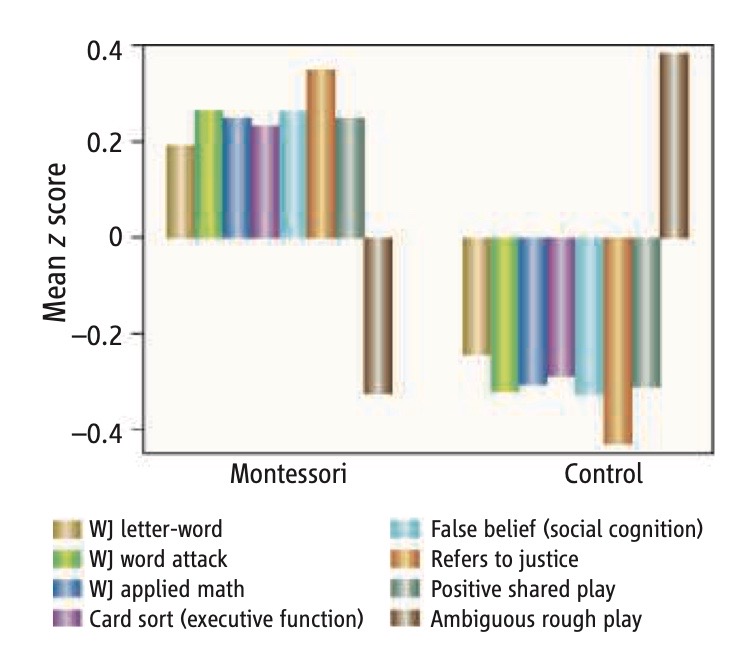 This study examines students' academic and social scores in a Montessori school as compared with other elementary school education programs. The effectiveness of some of these elements is noted as being supported by research on human learning.
This study examines students' academic and social scores in a Montessori school as compared with other elementary school education programs. The effectiveness of some of these elements is noted as being supported by research on human learning.
